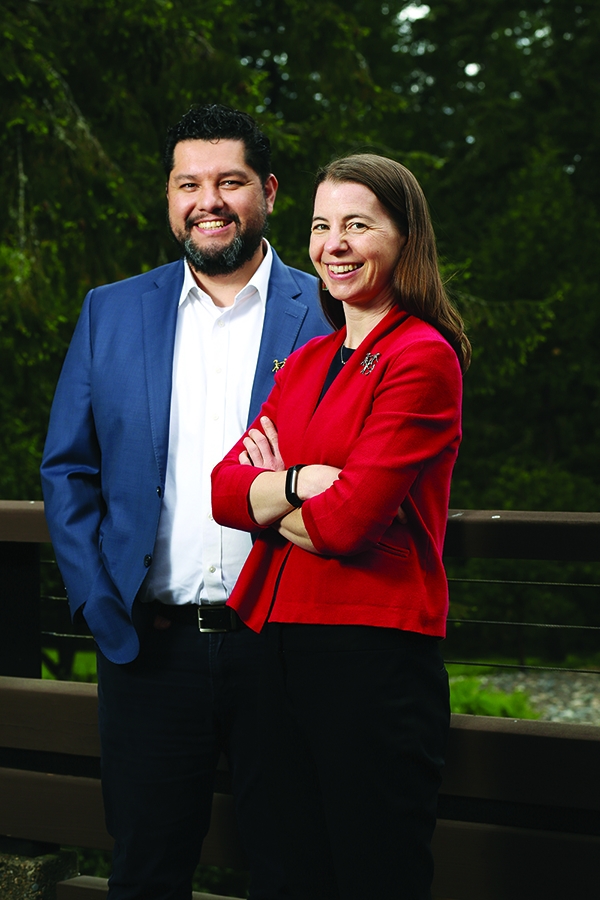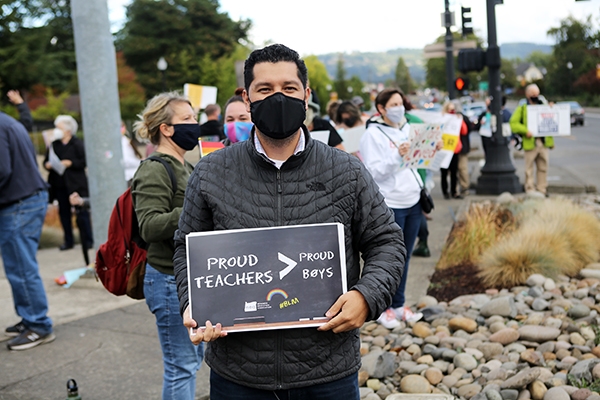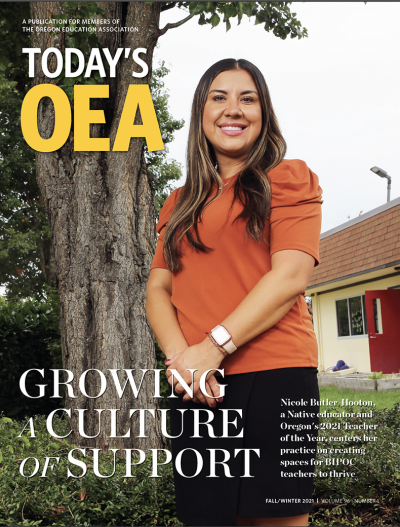Reed Scott-Schwalbach
OEA President
When Reed Scott-Schwalbach introduces herself, she often leads with a story about the people who raised her: teachers. Her story is wonderfully unique – she was raised in a cooperative community in a remote area of Alaska by her parents and their close friends, almost all of whom were special education teachers. Looking back on her childhood, she says she experienced nearly every single type of educational environment possible – from a cooperative community home school in her family’s remote Alaskan town, to a religious private school, to a suburban middle school in Nashville, where bussing was used as a means of racial integration. When she was in grade school, her family moved for a short time to the Commonwealth of the Northern Mariana Islands, and she attended a village school in Micronesiaon Saipan where she and her brother were the only two white children in an entire elementary school. Each of these school environments helped shape Scott-Schwalbach’s deep appreciation for the power of education, in all its varied forms. .
Like many educators, “I was raised with the really strong belief that education is the path to improving your life and those around you. I believe that for our students coming into our schools, we are there to provide them an experience that helps them become the best version of themselves,” Scott -Schwalbach says.
Understandably, education and the power of teaching has been the constant thread that connects Scott-Schwalbach’s most influential life moments together – and that, of course includes her newest role – serving as President of the 41,000-member Oregon Education Association.
As a young adult, Scott-Schwalbach considered different career options. “I thought I might become a physical therapist, or travel the world working for the Government, or even become an author. Becoming a teacher wasn’t necessary a clear path for me,” she remembers. “But, I have always loved languages. It has been vitally important to me that we make an effort to understand other cultures by learning languages. Language learning is also about empowering people to maintain a connection to their native language, which might not be present in the dominant culture.”
These values eventually led her to Pacific University in Forest Grove, Ore. to pursue degrees in education and Spanish. As a student at Pacific University, Scott-Schwalbach took her first foray into union organizing, where she supported farmworkers looking to unionize as a Spanish interpreter. After graduation with her teaching degree, she opted not to head into a classroom right away; she traveled globally, spending a year building houses in Guatemala and working as a medical interpreter. Finally, in 1999, she made her way back to Oregon, subbed through Portland-area schools for a school year, and eventually was offered a position teaching Spanish at Centennial High School, right outside of Portland.
“When we find our members’ passions and connect with them; when we ask them — ‘How can you put those passions into action? How can you put your community values into action?’ Only then can we diversify our leadership and begin to build, and that’s really, really important.”
— Reed Scott-Schwalbach
Within a few years as a new teacher, she had taken on leadership positions within her local association, moving quickly from Building Representative to President of Centennial Education Association. During her first year as President (and fourth year of teaching), “we were in a difficult bargain that went to mediation. We ended up going all the way to where we knew we’d either be settling that day, or we’d be going on strike,” she remembers. Her bargaining team ended up negotiating through the night and finally, at 10 a.m. on the following Saturday morning, walked out of the building with a settled contract. “I was really proud of the organizing work we did as a local. The power of good organizing leads to good results for educators, which helps us create better student learning environments – that was a lesson I learned very early on.”
The memory of those early days – and the warm welcome she felt as a substitute, a new teacher, and even a new union leader — continues to shape Scott-Schwalbach’s priorities. “We need to make sure our schools are as welcoming for educators as they are for our students. We need to put as much attention to building that community of support for our colleagues and substitutes as we do for students,” she says.
Personally, she also knows that as a white woman in a field that is predominantly filled with other white women, she was afforded the privilege of a warm welcome and supportive environment from the get-go, which often isn’t the norm for new educators of color. As President, she’s committed to changing that reality by focusing specifically on the recruitment and retention of newer BIPOC educators.
“Those new to our profession have so much to give,” Scott-Schwalbach says “I get so frustrated when I hear from our newer members that they’ve been told to ‘sit down and be quiet’ until they have more experience. There isn’t a predefined box for what makes a ‘good leader’ in the education space. We need to find our members’ passions and ask ‘How can we support you in putting those passions into action? How can you put your community values into action?’ Only then can we diversify our leadership and build for our union of the future, and that’s really, really important,” she says.

One of her concerns is truly big-picture: there aren’t enough students going into the education profession to sustain and grow it. She believes OEA can and should have a role in changing that dire reality. “We have so many students who go through our schools in Oregon and come out at the end of their experience saying, ‘I don’t want to go back. I could see how tough it is for my teachers.’ There’s an even more profound reaction to this from our BIPOC students, who are often not supported in our schools,” she notes. “We need to pay attention to this. As the most powerful labor organization in the state, we need to use our power to listen to students and make the necessary changes to the system.”
For Scott-Schwalbach, it starts with asking the hardest question of all: How am I, in unintended ways, helping create a system that doesn’t make students feel like it’s where they belong long-term?
The second piece of this question comes down to some of the basic tenets of a labor union – securing an economic reality (i.e. strong wages and benefits for educators, including Education Support Professionals) that enables new members to support their families and give back to their communities.
As an organization, Scott-Schwalbach points out, we also have to celebrate the strides we’ve already made for members. “It’s not perfect, but Oregon educators do have better protections around leave and higher quality benefit and compensation packages as compared to other states nationwide. Our union made these wins possible,” she says. In terms of celebrating the wins, Scott-Schwalbach continues to draw inspiration from the massive statewide actions that took place on May 8, 2019 – when tens of thousands of Oregon educators stood up for their students in the most visible and vocal way possible through the #RedForEd movement.
It’s easy to forget the good – particularly in the midst of never-before-seen challenges to public education brought on by the COVID-19 pandemic. It’s quite a time to assume OEA’s top leadership role, but having just ended two consecutive terms as OEA Vice President, Scott-Schwalbach feels prepared for the long road ahead. “We’re learning to live with the reality that COVID has created in our lives. It’s not easy, but by sticking together, listening to each other, and building solutions together — we’re going to be able to get through it."

Enrique Farrera
OEA Vice President
Did Enrique Farrera ever expect to be serving as Vice President of a 41,000-member labor organization?
“Never in my wildest dreams,” he says.
The Academic Advisor from Clackamas Community College credits the power of education for getting him to this point in his career – but there were certainly twists and turns along that path.
“Nothing about my journey to this point was traditional,” Farrera says. A little over ten years ago, Farrera was living on campus at Portland State University as a single dad of his then two-year-old daughter. He was an anthropology major and was leading a support group for undergraduate men of color through PSU’s diversity office. “I didn’t know exactly what my career was going to look like,” he remembers. One of his professors and mentors asked him about his post-graduation plans, and encouraged him to pursue graduate school.
That mentor probably saw in Farrera what so many others have seen in the years since – an incredible ability to connect with people from nontraditional backgrounds who need some real-world guidance outside of the safety of a college environment. An unwavering commitment to other students of color on campus, like himself. A barrier-breaking persona that would help him write his own unique story.
His move back into higher education eventually led Farrera to his job at Clackamas Community College serving students in an academic advising role as a classified staff member, where he worked for about 10 years before his election to the OEA leadership team this past Spring. His election makes him the first Hispanic member and first community college classified member to be elected to OEA’s second-highest office.

“I had so much appreciation for the students who came through our doors. In my position, I worked with such a range of students – from those who struggled with addiction, were homeless, to Veterans returning to finish their education, to those who might be business owners, or graphic designers who had their own studios. It was such a range of people. It’s what I’m going to miss most about the college environment,” Farrera says.
During his tenure at Clackamas Community College, Farrera dove headfirst into union work. Just two years into his career there, he was elected President of the Clackamas Community College Association of Classified Employees (CCC-ACE). He guided his local through tense negotiations and elevated the voices of classified higher education members at both state and national levels. In June of 2017, Farrera was appointed by Gov. Kate Brown to serve on Oregon’s Higher Education Coordinating Commission (HECC), the advising body to the Oregon Legislature, the Governor and Chief Education Office on policy that will help the state meet its post-secondary goals. When he was appointed, Farrera became one of just two community college members, the only OEA member, and the only classified employee member on the commission.
Later that same year, Farrera was elected to serve as an NEA Director, building the link between OEA members’ experiences and education policy-making at the federal level. His conversations with US Senators and Representatives helped shed light on the struggles faced by educators – and the passion they bring to their jobs every day. Though he represented all OEA members in that role, Farrera never lost sight of where he got his start as an advocate – fighting for hardworking and often under-resourced classified educators.
Today, Farrera is approaching his fifth month in office as OEA Vice President – which means he’s left the college campus that’s been his home for the better part of a decade. Making such a momentous career shift in the middle of a pandemic isn’t for everyone, but Farrera is ready and willing to make the leap.
“There’s definitely no textbook for this,” he jokes about the uncertainties that lie ahead. “I want to continue doing what I’ve always done, and that is listening to the experiences of our members and hearing about their working conditions and the difficulties that they’re facing.”
Part of his role as Vice President is to oversee the OEA Foundation, the nonprofit arm of our union that provides grants to members to support students’ basic needs, like clothing and essential healthcare items. The pandemic has put unprecedented financial pressure on the OEA Foundation as more members are accessing grants for their students than ever before. Last fall, in the wake of devastating wildfires that ripped through Oregon, the OEA Foundation opened up its grant application process to provide wildfire relief for students – in total offering more than $100,000 in relief grants to hundreds of Oregon students over the last school year.
Farrera has big hopes for the Foundation over the next two years, but knows its success is dependent on the members who reach into their pockets to give through payroll deduction. Their heartwrenching stories about their students give him pause, as he realizes the importance of the role he’s now been elected to serve.
Just a few weeks ago, Farrera made the drive from Portland to Klamath Falls and back in one day. He joined members for a Saturday afternoon barbecue before making the journey home. “We talked openly about everything they’re going through – all the challenges they’re facing this year. I replayed their stories over and over in my head, the whole drive home,” he reflects. In some ways, he says, his background as an immigrant and person of color working in higher education gives him a deeper understanding of what members in our more rural districts might be facing.
“We have something in common, and that is the human struggle. The system wasn’t designed with me, or often them, in mind. It’s why I’m able to connect with members who don’t fit in more traditional roles or who live in these rural areas,” Farrera says. “Those stories gave me the perspective I needed: how can I help our members and students in a way that makes a real difference for them? That's what really motivates me."

